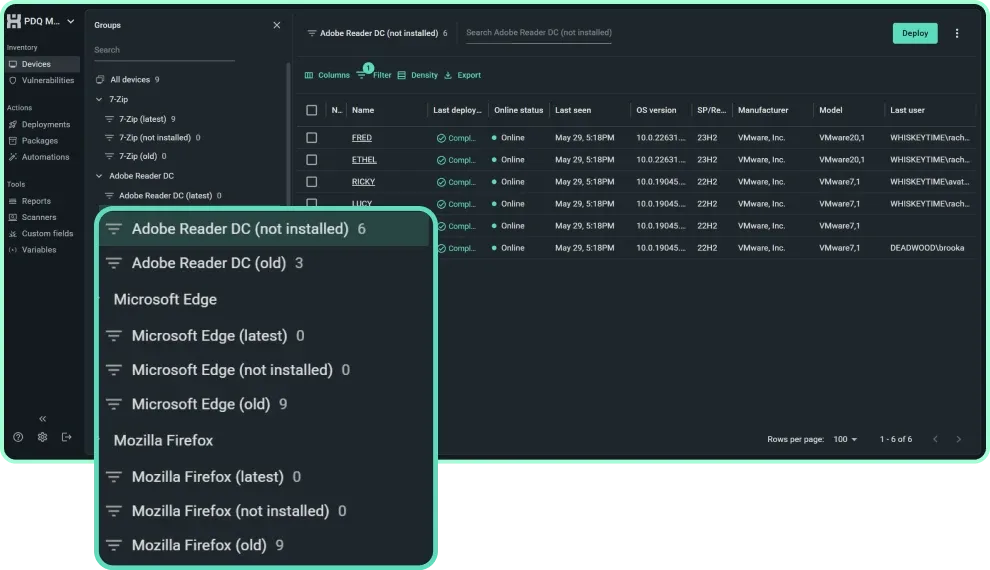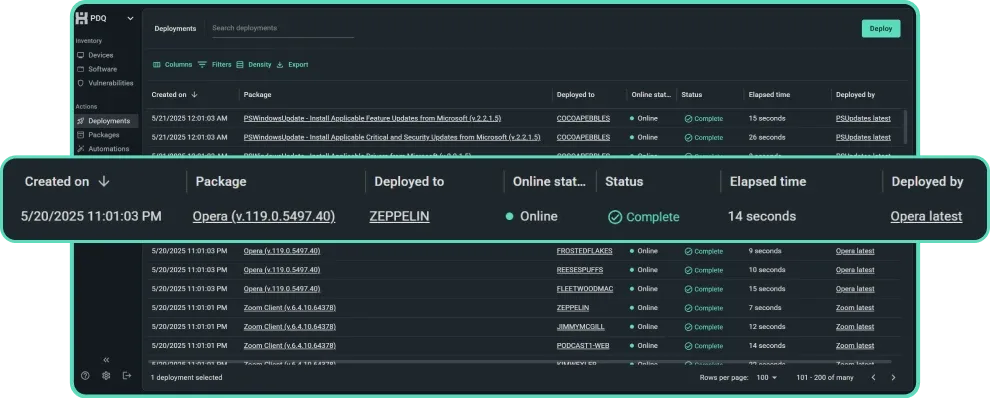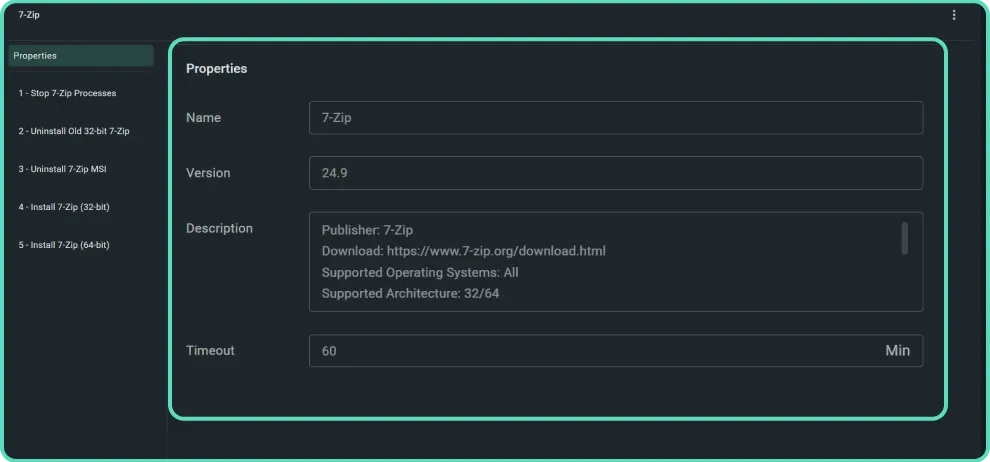SOFTWARE DEPLOYMENT SOFTWARE
Deploy software in seconds to devices anywhere
Push out the apps you need, when you need them. PDQ Connect lets you deliver software from the cloud, no VPN needed.
Get devices up and running quickly
Whether you’re onboarding users or rolling out new hardware, PDQ Connect gets the job done faster than you can say “I need another energy drink.”
Manage deployments with minimal effort
Easily push, schedule, and scale software deployments — no matter where your devices are.


Flexible deployments
Push software right away, on a schedule that works for you, or automatically when certain criteria are met. Your fleet, your rules.
Device groups
Create device groups based on prebuilt or custom criteria so you can easily deploy software to target groups of machines.
Rapid deployments
Deliver software and critical patches to devices across your organization in seconds — without requiring a VPN.


Take the guesswork out of deployments
Know exactly what’s been installed, where, and when — with built-in logs, inventory, and reporting.
Deployment history
See the real-time status of your deployments and detailed logs so you know what was installed, when, and where.
Detailed inventory data
View information like device name, IP address, and installed apps to make sure everyone has what they need.
Reporting
Create detailed reports on device health, patch status, and CVE coverage. Automate report sharing for visibility and compliance.
Deploy apps like a pro
Prebuilt packages, powerful customizations, and large file support give you everything you need to deploy your way.


Prebuilt packages
PDQ maintains a package library of over 100 of the most popular apps, tested and ready for you to deploy.
Custom packages
Create your own custom multistep packages that you can upload and set to install automatically.
Large file deployments
Deploy applications up to 20 GB in size to remote devices with a simple package — ideal for large-sized software rollouts.
“Being able to manage our remote computers and have deployments go out exactly how and when we want them to, reliably, has been huge."
James Davis, NEI Electric Power Engineering, Inc.


4.8 of 5 stars on Capterra
95% likely to recommend to others
4.9 of 5 stars on G2
Try PDQ Connect to manage software deployments at scale.
FAQs
What is software deployment?
Software deployment is the process of delivering and installing software applications or updates to end users or systems, making them operational in a target environment. Effective software deployment includes the tasks that make a software system available to users — from software development to testing to monitoring. For enterprises, software and application deployment most often entail installing, updating, and uninstalling third-party software.
What is a software deployment tool?
A software deployment tool automates the process of releasing applications to servers, devices, or users. It handles tasks like installation, configuration, updates, and software rollback, ensuring consistent and efficient deployment across environments. These software deployment tools save time, reduce errors, and help teams deliver software faster and more reliably.
How does software deployment differ from patch management?
Software deployment involves installing or delivering a full software application or update to systems, often as part of a software release process. Patch management, on the other hand, focuses specifically on updating existing software with fixes or security patches. While deployment handles entire apps, patching zeroes in on correcting or improving what's already installed.
How do you deploy software to remote devices?
To deploy software to remote devices, you typically use an agent-based tool like PDQ Connect. Once the agent is installed, you can deploy a software package to any Windows device when it connects to the internet.
How can you automate software deployment?
To automate software deployments, use software solutions like PDQ Connect that streamline each step — from building and testing deployment packages to scheduling rollouts and managing updates.
Deployment automation reduces the need for manual deployment, minimizes errors, and ensures consistency across devices. With features like prebuilt packages and patch automation, you can easily scale your successful deployment strategy.
What are software deployment best practices?
Software deployment best practices include implementing automated deployments, applying patches quickly, maintaining a clear deployment checklist, removing unnecessary software, reviewing metrics, and having a rollback plan.
Following software deployment best practices can minimize downtime and errors. But while these tips boost efficiency, your team should tailor them to fit your specific environment and deployment needs.
How do you choose the right software deployment solution?
Choosing a successful software deployment solution means aligning the tool’s capabilities with your team’s needs. If speed is a priority, look for tools that enable fast software deployment without compromising control. Consider your budget, whether you need a remote installer, and how the tool fits your workflow. A solution like PDQ Connect offers remote flexibility and helps you deploy software fast across your environment. Always test-drive with a demo to ensure the tool fits your basic deployment strategy.
What types of software can I deploy using PDQ?
With PDQ, you can handle PC software deployment for everything from Windows updates to popular third-party tools, like Chrome, Zoom, and Adobe Reader. Use the PDQ Package Library for ready-to-deploy apps, or create custom packages tailored to your environment. Whether it’s an essential software update or new software, PDQ makes deployment fast, flexible, and reliable across your fleet.
Can I deploy third-party applications with PDQ?
Yes, with PDQ you can easily deploy third-party applications thanks to the PDQ Package Library, which includes a regularly updated collection of popular third-party apps. You can also build custom packages as needed.
With PDQ, deploying and maintaining third-party software across your devices becomes a streamlined, automated software deployment process that saves time and reduces manual effort.
Do I need Active Directory to use PDQ for software deployment?
No, you don’t need Active Directory to use PDQ Connect for software deployment. PDQ Connect is designed with remote and hybrid environments in mind, and it works independently of AD. It uses an agent-based approach, so you can deploy software to any connected Windows device without relying on domain membership or on-prem infrastructure.
Does PDQ provide software deployment reporting and visibility?
Yes, PDQ provides robust software deployment reporting and visibility. With features like custom variables and email reports, you can track deployments, monitor deployment failures and successes, and keep stakeholders informed. Whether you're auditing activity or troubleshooting issues, PDQ gives you the insight needed to manage software across your fleet efficiently.
